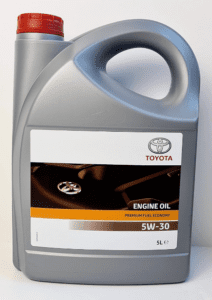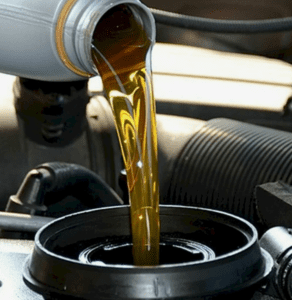Toyota engine oil 5w30

Toyota commonly recommends 5W-30 engine oil for many of its vehicles. The numbers represent the oil’s viscosity, with the first number (5W) indicating its flow at low temperatures (winter rating), and the second number (30) indicating its performance at higher temperatures.
For a Toyota vehicle, it’s important to use an oil that meets the manufacturer’s specifications, such as:
- Synthetic or Semi-Synthetic: Toyota vehicles often perform best with fully synthetic or semi-synthetic oils.
- API Certification: Look for oil that meets API SN or higher standards (e.g., SN Plus, SP).
- ILSAC GF-5 or GF-6: Toyota usually recommends oils that meet these fuel efficiency and performance standards.
It’s also a good idea to check your vehicle’s owner manual or consult a dealership to confirm the specific oil type for your engine.
Toyota engine oil 5w30 performance review
Engine oil performance is crucial for maintaining engine health, and Toyota’s recommended 5W-30 oils are known for providing a good balance of protection, fuel efficiency, and longevity. Here’s a breakdown of the performance review for 5W-30 engine oil used in Toyota engines:
1. Cold Start Performance
- 5W indicates that the oil flows easily at low temperatures, which is important for cold starts. The oil helps prevent wear by lubricating the engine quickly, reducing friction in freezing or cold weather.
- Toyota engines are typically well-calibrated for this viscosity, ensuring a smooth start even in colder climates.
2. Fuel Efficiency
- 5W-30 oil strikes a good balance between engine protection and fuel economy.
- Many synthetic 5W-30 oils have friction modifiers that help improve fuel economy by reducing internal engine friction, making it ideal for Toyota’s focus on efficient performance.
3. Engine Wear Protection
- The 30 in the oil’s rating provides thicker protection at higher temperatures, which is critical for maintaining engine parts and reducing wear in Toyota’s engines.
- High-quality synthetic 5W-30 oils often provide enhanced resistance to thermal breakdown, reducing wear during heavy loads and high-speed driving.
4. Oil Longevity
- Most synthetic 5W-30 oils offer extended oil change intervals, often lasting between 7,500 to 10,000 miles depending on driving conditions. This is especially useful for Toyota vehicles that benefit from regular long-life oil for fewer oil changes.
- High-performance oils in this category resist sludge formation, ensuring a clean engine over time.
5. Thermal Stability
- 5W-30 oils provide excellent performance in both cold and hot temperatures. For Toyota’s engines, which often operate at a range of temperatures, 5W-30 ensures consistent protection.
- This oil is less likely to break down under high-temperature conditions, reducing the risk of deposits or sludge build-up.
6. Specific Toyota Engine Benefits
- Toyota engines, including those in models like the Yaris, Corolla, and Camry, are designed to work well with 5W-30 oil. It helps optimize their fuel efficiency and longevity.
- For performance-oriented Toyota vehicles like the GR Yaris, synthetic 5W-30 oil provides the added protection needed for higher-performance driving.
Brand-Specific Oils for Toyota:
- Toyota Genuine Motor Oil: Toyota recommends their own branded oils that meet API standards and are optimized for Toyota engines.
- Mobil 1 Extended Performance 5W-30: A top choice for many Toyota owners due to its long-lasting protection and high thermal stability.
- Castrol EDGE 5W-30: Offers excellent wear protection and keeps the engine running smoothly under demanding conditions.
Overall Performance Verdict:
- 5W-30 engine oils recommended by Toyota perform well under a wide range of conditions, offering excellent protection, efficiency, and durability.
- For most Toyota vehicles, synthetic versions of this oil type provide the best balance between performance and longevity.
Is there a particular model you’re using this oil for? I can give more tailored advice based on that.
Toyota engine oil additive

Toyota, like most automakers, doesn’t necessarily recommend aftermarket oil additives, as high-quality engine oils (especially synthetic ones) already contain a blend of additives designed to provide the necessary protection and performance. However, if you’re considering engine oil additives for your Toyota, here’s a breakdown of what they can do and how they might (or might not) benefit your engine:
Common Toyota Engine Oil Additives and Their Functions
- Detergents and Dispersants
- Function: Help clean and prevent the formation of deposits, sludge, and varnish within the engine.
- Toyota’s Use: Most modern synthetic oils recommended for Toyota engines, such as 5W-30, already include detergents to keep the engine clean.
- Additive Need: Additional detergent additives may not be necessary unless the engine has sludge build-up or is subjected to harsh conditions.
- Friction Modifiers
- Function: Reduce friction between moving parts, which can improve fuel efficiency and reduce engine wear.
- Toyota’s Use: Many engine oils, especially high-quality synthetic ones, already include friction modifiers. For Toyota’s performance engines, such as those in the Toyota GR Yaris, these modifiers help ensure smooth operation.
- Additive Need: Adding more friction modifiers isn’t typically needed unless you’re pushing the engine under extreme conditions, like racing.
- Anti-wear additives (e.g., Zinc or ZDDP – Zinc dialkyl dithiophosphate)
- Function: Protect metal surfaces in the engine from wear, especially under high pressure.
- Toyota’s Use: Modern engine oils, including Toyota Genuine Motor Oil, already contain appropriate levels of ZDDP to protect the engine.
- Additive Need: Older engines might benefit from higher ZDDP levels, but newer Toyota engines with catalytic converters may not require extra ZDDP. In fact, too much can damage emissions systems.
- Viscosity Modifiers
- Function: Stabilize the oil’s thickness under different temperature conditions, helping it maintain optimal flow and protection.
- Toyota’s Use: The recommended 5W-30 oil for Toyota vehicles is already formulated to provide the right viscosity in a wide range of temperatures.
- Additive Need: Additional viscosity modifiers are generally unnecessary unless the engine is experiencing oil thinning or thickening under extreme conditions.
- Seal Conditioners
- Function: Help maintain or restore the elasticity of seals to prevent leaks.
- Toyota’s Use: Engine oil, especially synthetic oil, already includes some conditioners, but if you’re experiencing oil leaks in an older Toyota vehicle, a seal conditioner additive might help.
- Additive Need: Useful for older engines with minor oil leaks.
- Fuel System Cleaners
- Function: These help clean the injectors, valves, and fuel lines to improve combustion efficiency.
- Toyota’s Use: These are typically not added directly to the engine oil but rather into the fuel tank. Toyota engines, particularly newer ones, benefit from occasional use of such cleaners to maintain optimal fuel system performance.
When Additives Might Be Useful for a Toyota:
- Older Toyota Models: If you’re driving an older Toyota with high mileage, certain oil additives like seal conditioners or high-mileage blends with extra anti-wear protection can be helpful.
- Performance Applications: For racing or extreme performance, using specific oil additives to further reduce friction or improve viscosity stability may offer some marginal gains.
- High-Stress Conditions: Engines that are under high stress, such as those in towing, off-roading, or operating in extreme heat or cold, may benefit from additives that bolster oil protection and longevity.
Potential Downsides of Additives:
- Overuse: Too many additives can disrupt the balance of an already well-formulated engine oil, leading to diminished performance or even damage over time.
- Warranty Concerns: Using aftermarket oil additives could potentially void certain warranties if they result in engine damage or if they interfere with Toyota’s recommended maintenance practices.
Recommended Oil Brands for Toyota (with pre-blended additives):
- Toyota Genuine Motor Oil: Comes with the necessary additives tailored to Toyota engines.
- Mobil 1: Known for its strong additive package, including anti-wear agents and friction modifiers.
- Castrol EDGE: Provides high thermal stability with robust detergents and anti-wear additives.
Conclusion:
For most Toyota engines, high-quality synthetic oils with factory-blended additives provide all the protection and performance required. Additives may only be necessary in very specific situations, like high-mileage engines or extreme performance. It’s always a good idea to check the vehicle’s owner manual or consult with a Toyota service center before using any aftermarket oil additives.


